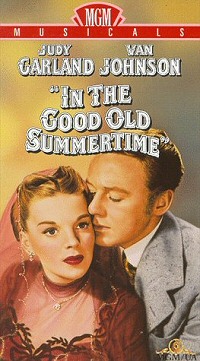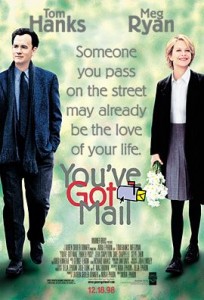
Margaret Sullavan and James Stewart in “The Shop Around the Corner”: heart-to-heart, but not eye-to-eye. MGM, 1940/Wikimedia Commons
—————————————
In a world of reality television and cheesy stadium-pop music, finding good, intelligent escapist entertainment is a lot harder than it ought to be. The idea is to tickle your brain, not insult it, and tickling takes a certain deftness with the feather that far too many entertainers lack.
I turn to certain writers. Jasper Fforde and the outrageous wordplay of his Thursday Next and Nursery Crime novels. John Mortimer and his Rumpole stories. Ellis Peters and her Brother Cadfael medieval mysteries. Thurber and Wodehouse and Christopher Buckley, whose Little Green Men and Thank You for Smoking so audaciously straddle the line between cynicism and glee. I listen to good musicians performing Cole Porter. I watch Gene Kelly or Ann Miller or Gregory Hines dance. I revisit the raw brilliance of John Belushi in Blues Brothers or Animal House, or his comic soulmate Jack Black in School of Rock.
 And I watch chick flicks. Not just any chick flick, but the well-written, well-performed ones that tend to fall into the folds of screwball or romantic comedy. Yes, I like the movies of Nora Ephron, and if that drums me out of the league of tough-guy arts observers, so be it.
And I watch chick flicks. Not just any chick flick, but the well-written, well-performed ones that tend to fall into the folds of screwball or romantic comedy. Yes, I like the movies of Nora Ephron, and if that drums me out of the league of tough-guy arts observers, so be it.
What exactly is a chick flick? The term’s a mild put-down that means something like, “inconsequential fluff that panders to womanly emotions,” but that’s a short-sighted way of looking at things. Isn’t the supposedly feminine point of view — that pursuing happiness is better than winning through intimidation — the crux of the civilizing process? Better Katharine Hepburn leading Cary Grant on a wild goose chase than Dirty Harry making his day with a gun in your face, although Harry has his lower-cortex satisfactions, too.
 The best chick flicks exude optimism, which of course makes them immediately suspect in intellectual circles. (Then again, a lot of intellectuals miss the point that Waiting for Godot is as much a vaudeville comedy as it is an existential outcry: Even Beckett enjoyed a good giggle.)
The best chick flicks exude optimism, which of course makes them immediately suspect in intellectual circles. (Then again, a lot of intellectuals miss the point that Waiting for Godot is as much a vaudeville comedy as it is an existential outcry: Even Beckett enjoyed a good giggle.)
But in a good chick flick, the optimism isn’t blind. It’s based on a belief that personal fulfillment is a matter of finding the right fit in life. That fit most likely involves finding the right romantic mate (although it could also be the right profession or cause or community), which in a larger sense means discovering the truth about yourself and putting yourself in a position where you don’t have to pretend.
And while the consummation might be a juicy kiss or an “I do” and is certainly about sexual attraction, it is more deeply about finding the person whose quirks and foibles you can put up with for a lifetime, because the underlying connection is profound.
 It’s a coupling of equals built on compromise and respect, and it typically involves wriggling out of a bad potential match and shedding several layers of self-delusion so you can see the simple beauty of what ought to be. That often requires eating a few slices of humble pie and taking some practical steps. In that sense, Jane Austen is the mother of all chick flicks. And Shakespeare, with his comic creations of Kate and Petruchio in The Taming of the Shrew and Beatrice and Benedick in Much Ado About Nothing, might be their grandpa.
It’s a coupling of equals built on compromise and respect, and it typically involves wriggling out of a bad potential match and shedding several layers of self-delusion so you can see the simple beauty of what ought to be. That often requires eating a few slices of humble pie and taking some practical steps. In that sense, Jane Austen is the mother of all chick flicks. And Shakespeare, with his comic creations of Kate and Petruchio in The Taming of the Shrew and Beatrice and Benedick in Much Ado About Nothing, might be their grandpa.
In a good chick flick, you know the ending right off the bat. That bugs a lot of critics, who complain that the show is predictable and formulaic. So it is. But so what? Sure, you know where the story’s taking you, but how you get there is most of the fun. The ride can be as raunchy as Bull Durham or as raucous as Working Girl or as delicate as 84 Charing Cross Road. The variety that lives inside familiarity is astonishing, and becoming comfortable with the little surprises of the familiar is one of the pleasures of life.
If the critical challenge of the chick-flick hero and heroine is to bring a split personality into harmony — the “false” personality of social striving and mistaken assumptions giving way to the “true” personality of inner self-awareness, even as it steels romantic idealism in the crucible of practicality — then Miklos Laszlo‘s 1937 Hungarian play Parfumerie is an almost perfect example of the form. Set in Budapest, it’s about a pair of shop clerks who bicker through their everyday lives but who also indulge in an idealized, platonic affair with an unknown pen pal, eagerly awaiting the next heartfelt letter of devotion.
They are writing, of course, to each other, although neither realizes it — and when they finally do, the two competing halves of their personalities can merge, which in turn allows a merging of their two previously competing lives, which in its turn allows them, as a social unit, to join the rest of the community as a team. That’s the way to build a civilization: on diplomacy and mutual benefit, not on war. If a little slap and tickle also happens your way, so much the better.
Parfumerie inspired three movies: 1940’s The Shop Around the Corner, with James Stewart and Margaret Sullavan; 1949’s In the Good Old Summertime, with Van Johnson and Judy Garland; and 1998’s You’ve Got Mail, with Tom Hanks and Meg Ryan. It’s also the basis for the 1963 Broadway musical She Loves Me, which will be revived in the 2010 season at the Oregon Shakespeare Festival in Ashland.
It’s remarkable how alike these three films are, even though each is distinctly its own creation. The Shop Around the Corner, which is set in Budapest although Stewart and Sullavan make no effort to sound eastern European, is the closest to the original play. In the Good Old Summertime switches the action to Chicago and adds a few songs (including some knockout barbershop harmony), but also picks up crucial scenes and whole bits of dialogue almost word for word from the earlier movie.
You’ve Got Mail, which Nora Ephron directed from her sister Delia Ephron’s script, takes the most liberties. It’s set on the Upper West Side of New York in the 1990s, and instead of being co-workers its leading characters are business antagonists: He and his family own a Barnes & Noble-like book chain, she owns a small children’s book store (called “The Shop Around the Corner”) that the mega-store runs out of business. Most crucially, the letters of the earlier versions become emails: Kathleen and Joe “meet” in an over-30 chat room long before they meet in the flesh. Yet, again, crucial scenes and even some dialogue are picked up from the original versions: All three movies hang on the same solid skeleton. (And no, it’s no accident that Pride and Prejudice has a small but vital role in the plot of You’ve Got Mail: The Ephrons know a predecessor when they see one.)
The brilliant craftsman Ernst Lubitsch directed The Shop Around the Corner, and it sparkles with his graceful sophistication. That gets picked up, if not entirely matched, in the later versions. Watching the three movies on consecutive evenings, as I did recently, emphasizes how enjoyable it can be to see different performers and directors approaching what’s essentially the same material: It’s the sort of joy in variety that live theater affords.
And it points out how important, even in star vehicles, ensemble acting is. Another part of the wisdom of these three films (and of good chick flicks in general) is that not everyone is glamorous. The stars are surrounded by solid character actors who represent, beyond their own comic skills, the reality of life in a cultured community: It takes all kinds, and that’s a good thing.
The Shop Around the Corner enjoyed the comic skills of Frank Morgan (the wizard in The Wizard of Oz) as the autocratic shopkeeper. In the Good Old Summertime surrounded its stars with the likes of Buster Keaton, Spring Byington and the crotchety-hilarious S.Z. Sakall as the shopkeeper, this time of a music store (plus Garland’s 3-year-old daughter, Liza Minelli, as a chubby toddler). You’ve Got Mail enjoyed the light-comic charms of Greg Kinnear, Parker Posey, Dabney Coleman, Jean Stapleton, John Randolph, Dave Chappelle and Steve Zahn — and imagine a stock company with that sort of talent to draw from.
In the end, a good chick flick takes you to a place of affirmation. We can be better than we are. We can overcome our worst instincts. We don’t have to change what we are, we only have to realize what we are, and then make the most of it. We are better together than apart. We can overcome hardships, especially the self-inflicted ones. We can discover something bigger than ourselves. We can laugh. We might even have some pretty good sex.
I’m not sure dying’s easy. But I do know comedy’s hard, and when someone makes it work, it’s a gift. So thanks, clowns. Maybe you don’t get the respect you deserve. But we all needed that.